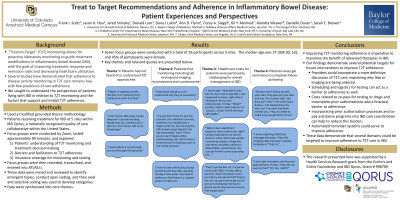Tuesday Poster Session
Category: IBD
P4361 - Treat to Target Recommendations and Adherence in Inflammatory Bowel Disease: Patient Experiences and Perspectives
Tuesday, October 29, 2024
10:30 AM - 4:00 PM ET
Location: Exhibit Hall E

Has Audio

Frank I. Scott, MD, MSc(Epi)
University of Colorado Anschutz Medical Campus
Aurora, CO
Presenting Author(s)
Frank I.. Scott, MD, MSc(Epi)1, Jason K. Hou, MD, MS, FACG2, Jared Sninsky, MD, MSCR2, Donald Lum, MD, FACG3, Dana J. Lukin, MD4, Ann D. Flynn, MD, FACG5, Corey A.. Siegel, MD, MS6, Gil Y. Melmed, MD7, Alandra Weaver, MPH8, Danielle Duran, MA9, Sarah E. Brewer, PhD, MPA1
1University of Colorado Anschutz Medical Campus, Aurora, CO; 2Baylor College of Medicine / Michael E. DeBakey Veterans Affairs Medical Center, Houston, TX; 3The Oregon Clinic, Portland, OR; 4Jill Roberts Center for Inflammatory Bowel Disease, New York Presbyterian Hospital-Weill Cornell Medicine, New York, NY; 5University of Utah, Salt Lake City, UT; 6Dartmouth-Hitchcock Medical Center, Lebanon, NH; 7Cedars-Sinai Medical Center, Los Angeles, CA; 8Crohn's and Colitis Foundation, New York, NY; 9University of Colorado School of Medicine, Aurora, CO
Introduction: “Treat-to-Target” (T2T) monitoring allows for proactive laboratory monitoring to guide treatment modifications in inflammatory bowel disease (IBD), with the goal of improving response and remission rates and decreasing healthcare utilization. T2T adherence remains low. We sought to understand the perspectives of patients living with IBD in relation to T2T monitoring and the factors that support and inhibit T2T adherence.
Methods: Using a modified grounded theory methodology, we conducted online focus groups (FG) with patients receiving treatment for IBD at 5 sites within IBD Qorus, a nationally recognized quality of care collaborative within the United States. FGs were conducted by Zoom, lasted ~90 minutes, and explored patients’ understanding of T2T, monitoring and treatment decision-making, barriers and facilitators to T2T adherence, and insurance coverage for monitoring and testing. FGs were recorded, transcribed, and entered into ATLAS.ti. We mined field notes and reviewed transcripts to identify emergent topics, conducted open coding, then used axial and selective coding to develop categories. Data were synthesized into core themes.
Results: 29 patients from 5 sites participated in 7 total FG with an average of 4 patients per group, with 45% female. Our analysis revealed four main themes influencing low T2T uptake and adherence among patients: 1) patients had not heard of or understood T2T approaches; 2) patients find monitoring including lab testing and imaging inconvenient and cumbersome; 3) healthcare costs for patients were particularly challenging for overall management of IBD; and 4) patients rarely get reminders to complete follow-up testing (Table 1).
Discussion: Improving T2T monitoring adherence is imperative to maximize the benefit of advanced therapies in IBD. Our findings demonstrate that providers could incorporate a more definitive discussion of T2T care, explaining why labs or imaging are being ordered. Scheduling and logistics for testing can act as a barrier to adherence as well. This could be mitigated through more focused IBD care coordination and patient reminders. Costs related to co-pays for testing or drugs and incomplete prior authorizations add a financial barrier to adherence. Incorporating prior authorization processes and co-pay assistance programs into IBD care coordination can help to reduce this burden. These data demonstrate that several domains could be targeted to improve adherence to T2T care in IBD.
Note: The table for this abstract can be viewed in the ePoster Gallery section of the ACG 2024 ePoster Site or in The American Journal of Gastroenterology's abstract supplement issue, both of which will be available starting October 27, 2024.
Disclosures:
Frank I.. Scott, MD, MSc(Epi)1, Jason K. Hou, MD, MS, FACG2, Jared Sninsky, MD, MSCR2, Donald Lum, MD, FACG3, Dana J. Lukin, MD4, Ann D. Flynn, MD, FACG5, Corey A.. Siegel, MD, MS6, Gil Y. Melmed, MD7, Alandra Weaver, MPH8, Danielle Duran, MA9, Sarah E. Brewer, PhD, MPA1. P4361 - Treat to Target Recommendations and Adherence in Inflammatory Bowel Disease: Patient Experiences and Perspectives, ACG 2024 Annual Scientific Meeting Abstracts. Philadelphia, PA: American College of Gastroenterology.
1University of Colorado Anschutz Medical Campus, Aurora, CO; 2Baylor College of Medicine / Michael E. DeBakey Veterans Affairs Medical Center, Houston, TX; 3The Oregon Clinic, Portland, OR; 4Jill Roberts Center for Inflammatory Bowel Disease, New York Presbyterian Hospital-Weill Cornell Medicine, New York, NY; 5University of Utah, Salt Lake City, UT; 6Dartmouth-Hitchcock Medical Center, Lebanon, NH; 7Cedars-Sinai Medical Center, Los Angeles, CA; 8Crohn's and Colitis Foundation, New York, NY; 9University of Colorado School of Medicine, Aurora, CO
Introduction: “Treat-to-Target” (T2T) monitoring allows for proactive laboratory monitoring to guide treatment modifications in inflammatory bowel disease (IBD), with the goal of improving response and remission rates and decreasing healthcare utilization. T2T adherence remains low. We sought to understand the perspectives of patients living with IBD in relation to T2T monitoring and the factors that support and inhibit T2T adherence.
Methods: Using a modified grounded theory methodology, we conducted online focus groups (FG) with patients receiving treatment for IBD at 5 sites within IBD Qorus, a nationally recognized quality of care collaborative within the United States. FGs were conducted by Zoom, lasted ~90 minutes, and explored patients’ understanding of T2T, monitoring and treatment decision-making, barriers and facilitators to T2T adherence, and insurance coverage for monitoring and testing. FGs were recorded, transcribed, and entered into ATLAS.ti. We mined field notes and reviewed transcripts to identify emergent topics, conducted open coding, then used axial and selective coding to develop categories. Data were synthesized into core themes.
Results: 29 patients from 5 sites participated in 7 total FG with an average of 4 patients per group, with 45% female. Our analysis revealed four main themes influencing low T2T uptake and adherence among patients: 1) patients had not heard of or understood T2T approaches; 2) patients find monitoring including lab testing and imaging inconvenient and cumbersome; 3) healthcare costs for patients were particularly challenging for overall management of IBD; and 4) patients rarely get reminders to complete follow-up testing (Table 1).
Discussion: Improving T2T monitoring adherence is imperative to maximize the benefit of advanced therapies in IBD. Our findings demonstrate that providers could incorporate a more definitive discussion of T2T care, explaining why labs or imaging are being ordered. Scheduling and logistics for testing can act as a barrier to adherence as well. This could be mitigated through more focused IBD care coordination and patient reminders. Costs related to co-pays for testing or drugs and incomplete prior authorizations add a financial barrier to adherence. Incorporating prior authorization processes and co-pay assistance programs into IBD care coordination can help to reduce this burden. These data demonstrate that several domains could be targeted to improve adherence to T2T care in IBD.
Note: The table for this abstract can be viewed in the ePoster Gallery section of the ACG 2024 ePoster Site or in The American Journal of Gastroenterology's abstract supplement issue, both of which will be available starting October 27, 2024.
Disclosures:
Frank Scott: Crohn's and Colitis Foundation – Grant/Research Support. Takeda Pharmaceuticals – Grant/Research Support.
Jason Hou: Abbvie – Grant/Research Support. American Regent – Grant/Research Support. Bristol Myers Squibb – Grant/Research Support. Eli-Lilly – Advisor or Review Panel Member, Grant/Research Support. Janssen – Grant/Research Support. Pfizer – Grant/Research Support. Vedanta – Grant/Research Support.
Jared Sninsky indicated no relevant financial relationships.
Donald Lum: Abbvie – Consultant, Speakers Bureau. Janssen – Speakers Bureau. Lilly – Advisor or Review Panel Member.
Dana J. Lukin: AbbVie – Consultant, Grant/Research Support, Speakers Bureau. AltruBio – Consultant. Boehringer Ingelheim – Consultant, Grant/Research Support. Bristol Myers Squibb – Consultant. Eli Lilly – Consultant. Fresenius Kabi – Consultant. Janssen – Consultant, Grant/Research Support, Speakers Bureau. Magellan Health – Consultant. Palatin Technologies – Consultant. Pfizer – Consultant. Prometheus Laboratories – Consultant. PSI – Consultant. Takeda – Consultant, Grant/Research Support.
Ann Flynn: Abbvie – Advisory Committee/Board Member.
Corey Siegel: Abbvie – Advisory Committee/Board Member, Consultant, Grant/Research Support, Speaker for CME activities. BMS – Advisory Committee/Board Member, Consultant. Boomerang – Advisory Committee/Board Member, Consultant. Buhlman – Advisory Committee/Board Member, Consultant. Janssen – Advisory Committee/Board Member, Consultant, Grant/Research Support, Speaker for CME activities. Lilly – Advisory Committee/Board Member, Consultant. Napo pharmaceuticals – Advisory Committee/Board Member, Consultant. Pfizer – Advisory Committee/Board Member, Consultant, Grant/Research Support, speaker for CME activities. Prometheus Biosciences – Advisory Committee/Board Member, Consultant. Prometheus Labs – Advisory Committee/Board Member, Consultant. Roivant – Advisory Committee/Board Member, Consultant. Takeda – Advisory Committee/Board Member, Consultant, Grant/Research Support, speaker for CME activities. Trellus Health – Advisory Committee/Board Member, Consultant.
Gil Y. Melmed: AbbVie – Consultant. Arena Biopharmaceuticals – Consultant. Boehringer-Ingelheim – Consultant. Bristol Myers Squibb-Celgene – Consultant. Dieta – Consultant. Eli Lilly – Consultant. Ferring – Consultant. Fresenius Kabi – Consultant. Genentech – Consultant. Gilead – Consultant. Janssen Immunology – Consultant. Oshi Health – Consultant. Pfizer – Consultant, Grant/Research Support. Prometheus Labs – Consultant. Samsung Bioepis – Consultant. Shionogi – Consultant. Takeda – Consultant. Techlab – Consultant. Viatris – Consultant.
Alandra Weaver indicated no relevant financial relationships.
Danielle Duran indicated no relevant financial relationships.
Sarah Brewer: Abbott Laboratories – Stock-publicly held company(excluding mutual/index funds). Agilent Technologies – Stock-publicly held company(excluding mutual/index funds). Amgen Inc – Stock-publicly held company(excluding mutual/index funds). Biogen Idec, Inc – Stock-publicly held company(excluding mutual/index funds). Eli Lilly and Company – Stock-publicly held company(excluding mutual/index funds). Gilead Sciences Inc – Stock-publicly held company(excluding mutual/index funds). Merck & Co, Inc – Advisory Committee/Board Member, Stock-publicly held company(excluding mutual/index funds). Pfizer, Inc – Stock-publicly held company(excluding mutual/index funds). Quest Diagnostics – Stock-publicly held company(excluding mutual/index funds). Thermo Fisher Scientific – Stock-publicly held company(excluding mutual/index funds).
Frank I.. Scott, MD, MSc(Epi)1, Jason K. Hou, MD, MS, FACG2, Jared Sninsky, MD, MSCR2, Donald Lum, MD, FACG3, Dana J. Lukin, MD4, Ann D. Flynn, MD, FACG5, Corey A.. Siegel, MD, MS6, Gil Y. Melmed, MD7, Alandra Weaver, MPH8, Danielle Duran, MA9, Sarah E. Brewer, PhD, MPA1. P4361 - Treat to Target Recommendations and Adherence in Inflammatory Bowel Disease: Patient Experiences and Perspectives, ACG 2024 Annual Scientific Meeting Abstracts. Philadelphia, PA: American College of Gastroenterology.
